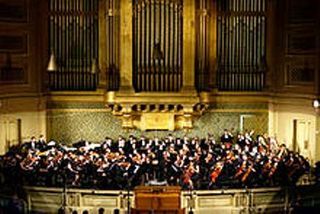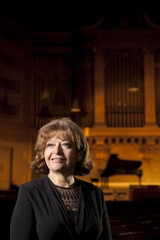|
Back
A Collegiate Colossus New York
Isaac Stern Auditorium, Carnegie Hall
04/21/2016 -
50th Anniversary Concert
Daniel Schlosberg: Small Talk
Charles Ives: The Unanswered Question
Paul Hindemith: Piano Concerto
Sir Edward Elgar: Coronation Ode, Op. 44: "Land of Hope and Glory"
Adam Guettel; Overture for a Fairy Tale Adventure (New York Premiere)
Leonard Bernstein Mass: "Celebrations" (Arranged by John Mauceri)
Richard Strauss: Festliches Präludium, Op. 61
Janna Baty (Mezzo-soprano), Kyle Guglielmo (Baritone), Idil Biret (Piano)
Yale Glee Club, Jeffrey Douma (Music Director), Elm City Girls’ Choir, Rebecca Rosenbaum (Music Director), Yale Symphony Orchestra, Toshiyuki Shimada (Music Director), John Mauceri (Guest Conductor)

Yale Symphony Orchestra (© Yale University)
One expected this half-century anniversary concert of the Yale Symphony Orchestra to be long (two-and-a-half-hours long), to have speeches (only two) and to show off the 100-odd players of the YSO in the most varied genres (and yes, they are good).
Unexpected, though, was how interesting the diversity of this program could be. One world premiere and one New York premiere, a piano concerto by a major composer which hasn’t been offered in many decades, and major/minor works by other mainline composers.
Not that this interest always panned out. When a great pianist like Idil Biret played the 1945 Hindemith Piano Concerto, that was a major event. Placing Elgar’s Hope And Glory right after that was an uncomfortable pairing. Conductor John Mauceri, who conducted the European premiere of Bernstein’s Mass gave a glorious arrangement here. Pairing that with the worst piece of bombastic claptrap ever written by Richard Strauss was not simply disconcerting: it was an insult.
That, however, did not detract from the excellent musicianship of the orchestra, the choruses, and their two galvanizing conductors. Toshiyuki Shimada is a conducting icon in Connecticut, especially Yale, and he has obviously molded the group into an exciting ensemble. He took over the first half of the program, which was fascinating from the first notes.
Those blurry notes belonged to Charles Ives, a student of Yale, and a composer who never forgot his marching-song allegiance to the college. His Unanswered Question is one of his most enigmatic works–except that the effect of offstage solo trumpet and wind ensemble never seems to work. Even in the New York Armory some years ago, the effect was too spacious, clever but not moving.
Mr. Shimada changed that. Placing the horn and winds on opposite sides of the two balconies, the Ives created, an actual cosmic feeling. It was a stunning opening.
All the composers were here were associated with Yale, and two recent graduates were represented. Daniel Schlosberg wrote a short delicious piece where strings played the percussion role, and the percussion played a kind of melody. This was a trick, yes, but the middle was an Ives-style marching song, that had the Ives-style surprise.
The other premiere was more Broadway (or Hollywood Bowl), an overture written for the show The Princess Bride by Adam Guettel. He is an inventive man, the tunes were pleasant, the orchestration lush, but it wasn’t in the class of the other works.

I. Biret at Yale (© Courtesy of the artist)
To this listener, the Hindemith Concerto, written for a Puerto Rican pianist in 1945, was the most surprising and captivating work of the whole evening. True, this was not the crazy ragtime Hindemith played by Jeremy Denk this week, but Hindemith did allow quite a bit of humor to work its way in.
The artist was Idil Biret, who, after 60 years on the concert stage and hundreds of excellent recordings, didn’t make her Carnegie Hall debut until last night.
Yet it was worth the wait. This is a tough concerto, and it needs a tough player who can essay the cadenzas, overcome the orchestra, and make the last movement as original as possible. This was where Hindemith gave the artist and orchestra four variations–including a pounding goose-step parody March–before announcing the variations at the end!! Like his opera Here and Back, Hindemith reversed the music. Both Ms. Biret and Mr. Shimada made it work.
So why did we need Elgar after that? Well, Hope and Glory as a graduation march, was played in Yale in 1905, when the composer was given an Honorary Degree. It didn’t fit in here (except for an inspiring solo by Janna Baty), but I tried to imagine it was played in honor of a) Queen Liz’s 90th Birthday and b) the 400th anniversary of Mr. Shakespeare’s most untimely death.
The second conductor of the evening is one of the most eclectic baton-masters in America. A colleague of Bernstein, a producer-conductor on Broadway and in Hollywood, a leader of major orchestras, an advocate and arranger for virtually every film composer today, John Mauceri had not only an aplomb but an obvious rapport with the orchestra.
His major work, part of the Bernstein Mass which he had arranged, had a fine baritone soloist in Kyle Guglielmo, the two choirs were larger than the YSO and sung the choruses and endless canons with youthful enthusiasm, and its professionalism was unquestioned.
Alas, after this version of the Mass, the concert ended with a work not the least bit associated with Yale–and probably a piece with which Richard Strauss hated to be associated. The Festival Prelude was commissioned for the opening of the Vienna Concert Hall in 1914, and it made the Shostakovich Leningrad Symphony played this week seem like a Telemann flute concerto in comparison.
Outside of a theme which sounded like the opening of Diamonds Are A Girl’s Best Friend, the composer’s call for 96 strings, quadruple winds, eight horns, six trumpets, twelve distant trumpets, four trombones, tuba, percussion and organ gave boisterous, brazen, and brassy sounds.
Mr. Mauceri didn’t shunt his duties, and he waved the massive crowd on stage like he was conducting a Teutonic football marching band instead of this most distinguished orchestra.
Harry Rolnick
|